ASC Scout Analysis: Robin Polley
-
May 15, 2020
- Posted by: Scott Geelan
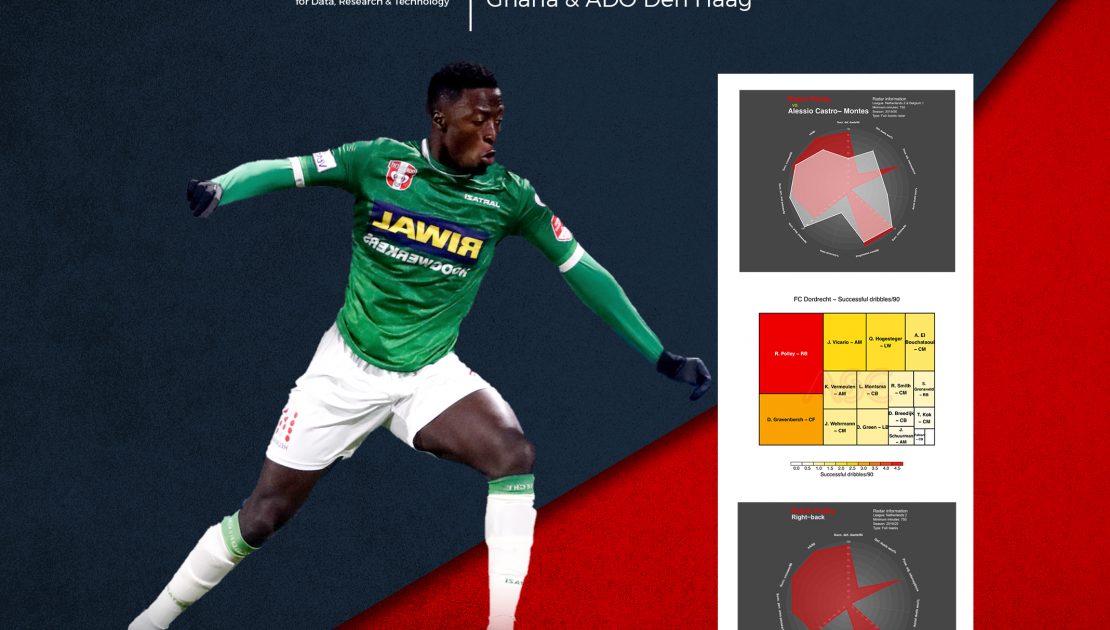
Basic information
Name: Robin Polley
Date of birth: 28.12.1998 (21 years old)
Position: Right-back
Club: FC Dordrecht (on loan from ADO Den Haag)
Height: 1.83m
International caps: 0 Black Stars, 2 Black Meteors
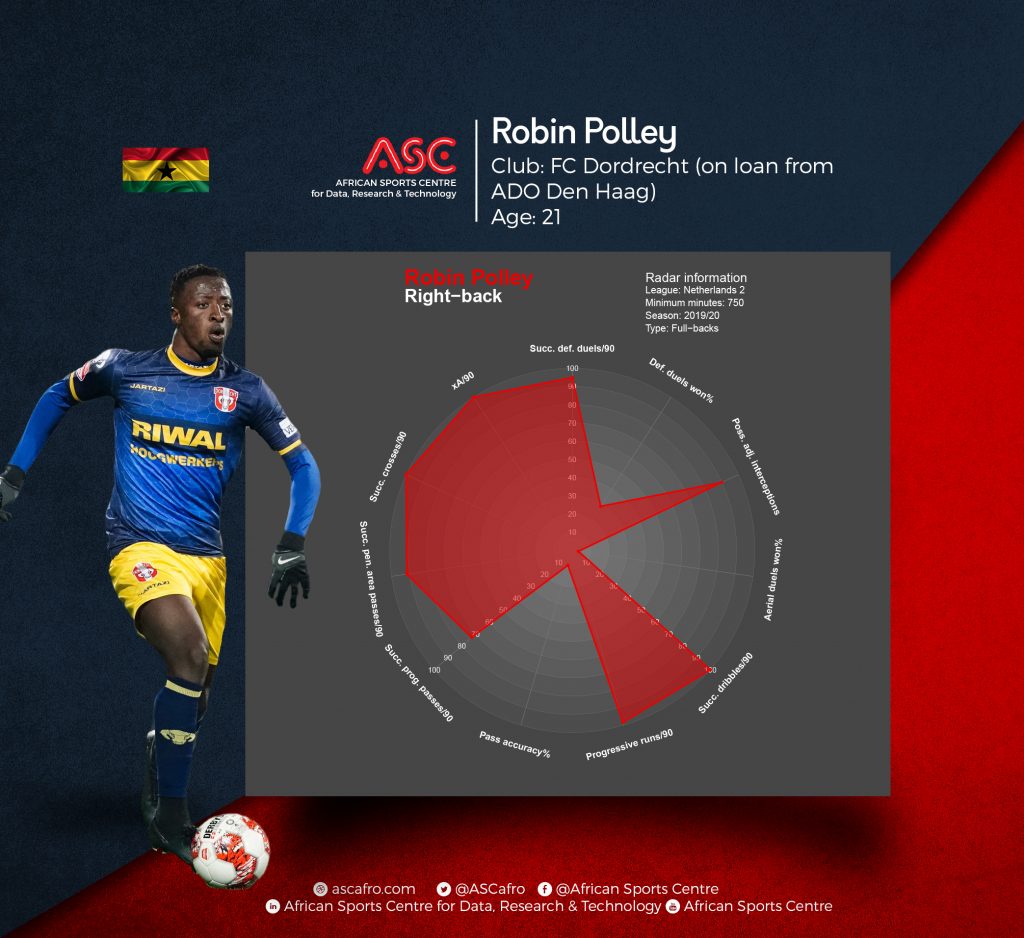
Summary
ADO Den Haag’s Robin Polley is a young right-back with impressive attacking qualities. The young Ghanaian is an accomplished dribbler, while also possessing creative intent and desirable physical attributes that translate to formidable statistical output in the attacking third. While the defensive side of his game needs work, unsurprising for a player who has spent most of his career as a winger, Polley is another representative of a growing class of young wingers becoming promising, attacking full-backs. As the game continues to develop, such players will become increasingly valuable.
Analysis
Dribbling ability
The preeminent area of Polley’s game is his dribbling ability. He was a winger throughout his youth career and is currently in just his second full season as a full-back. This experience has translated to his threat on the ball.
He possesses quick feet and accomplished close control, which he combines with impressive short-area quickness, speed and balance. Polley often uses body feints to manipulate the positioning of the closest defender and the young Ghanaian has the ability to beat multiple players in a small area, giving him real value in the attacking third in particular.
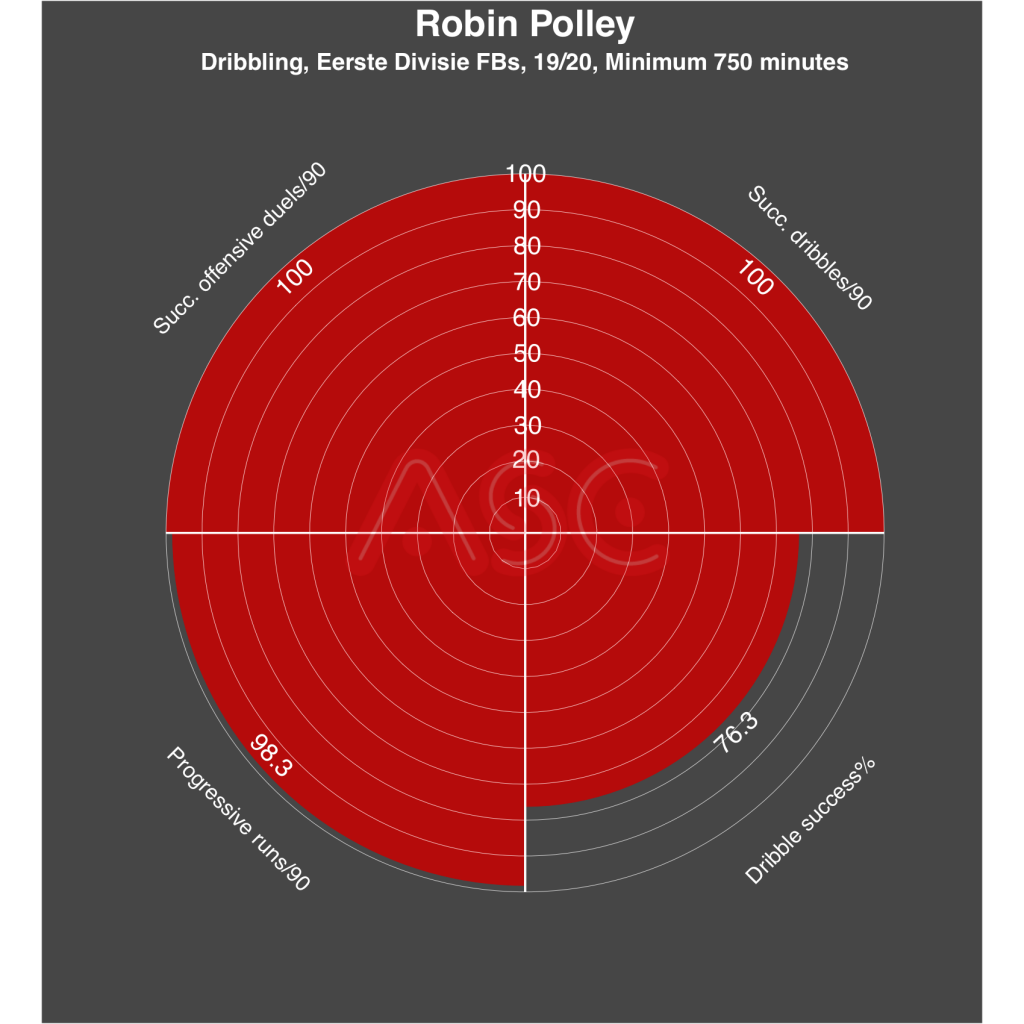
He is statistically remarkable amongst his peers at full-back in the Eerste Divisie. The young full-back returns the best numbers amongst full-backs for successful offensive duels/90 and successful dribbles/90 as well as operating in the 98th percentile for progressive runs/90. The final stat is particularly useful in highlighting Polley’s ability to move the ball effectively upfield as a dribbler.
Furthermore, he is not just a volume dribbler, with a dribble success percentage in the 76th percentile, which is particularly notable given his staggering volume of dribbles. Amongst other full-backs in the top twenty for dribble success percentage, Polley has by far the highest volume of dribbles, with 7.48 attempts per 90 minutes (the average is just 2.56 attempts). His success rate is indicative of his quality on the ball along with his decision making.
At times, he can overplay, which should improve with further experience. When he beats one or two players he needs to release the ball more quickly, especially in the final third. This enables his team to exploit the overloads that he created with his initial penetration.
Passing ability and creativity
Polley’s history as a winger has also ensured he is well-equipped as a creative force. Additionally, he has also shown himself to be a proficient ball progressor from the deeper areas he now occupies as a full-back.
The young Ghanaian possesses notable progressive and creative intent. He shows a willingness to move the ball quickly with one or two touches, to locate options between the lines and in the penalty area, and to cross into the penalty area from both deeper areas and the byline. His crossing targets dangerous areas and it is likely that were teammates getting into the penalty area in higher volumes, this area of Polley’s game would produce more actions ending in goals.
Nevertheless, he certainly stands to improve his delivery as a crosser. His delivery can make it challenging for his teammates to attack the ball effectively, as it can lack pace and/or accuracy. Additionally, the execution of his passing is occasionally poor, normally when he connects poorly with the ball. Both areas of his game would likely improve with an emphasis on consistent ball striking. Furthermore, he needs to beat the first man more often.
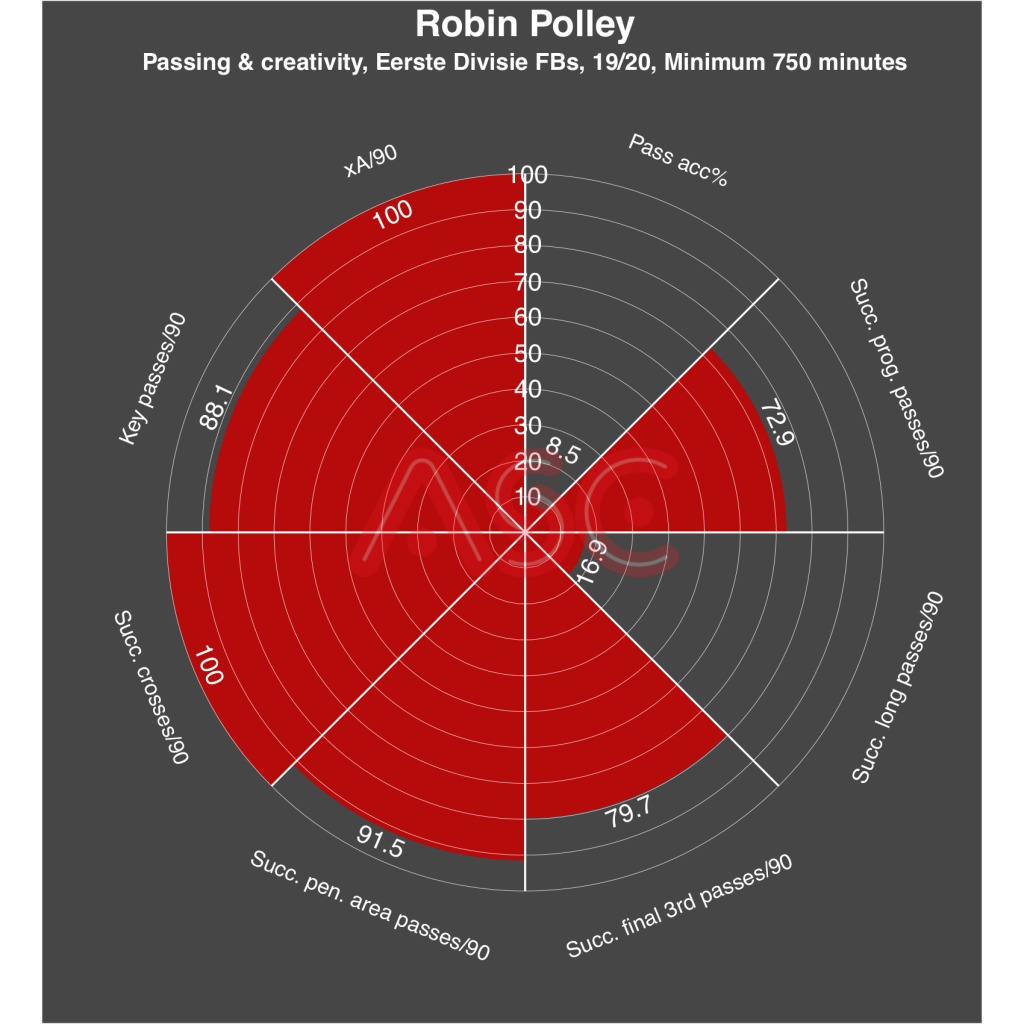
Polley is statistically conspicuous as a passer and creator. His pass accuracy and volume of long passes are both very low in comparison to his fellow Eerste Divisie full-backs, though the former is in part a result of his progressive and attacking intent. He has shown himself to be a capable long passer.
This intent is well-illustrated on the above visualisation and it shows the other aspect of his statistical conspicuousness in this area. He is operating in at least the 70th percentile in every measure except for accuracy and long passing volume. Most prominent are his remarkable volume of successful passes to the penalty area/90 (91st percentile), his successful crosses/90 (100th percentile), his key passes/90 (88th percentile) and his expected assists/90 (100th percentile). These statistics are all emblematic of Polley’s ability to influence the game in the attacking third through a high quantity of useful, quality actions.
Defensive ability
Not surprisingly for someone who has spent much of his career as a winger, the defensive side of Polley’s game requires the most work. Nevertheless, he has made strides this season which suggest he is on a positive upwards trend developmentally and has the capability to develop further. He also shows the requisite aggressiveness and some promising reading of the game to suggest he can continue to make those strides.
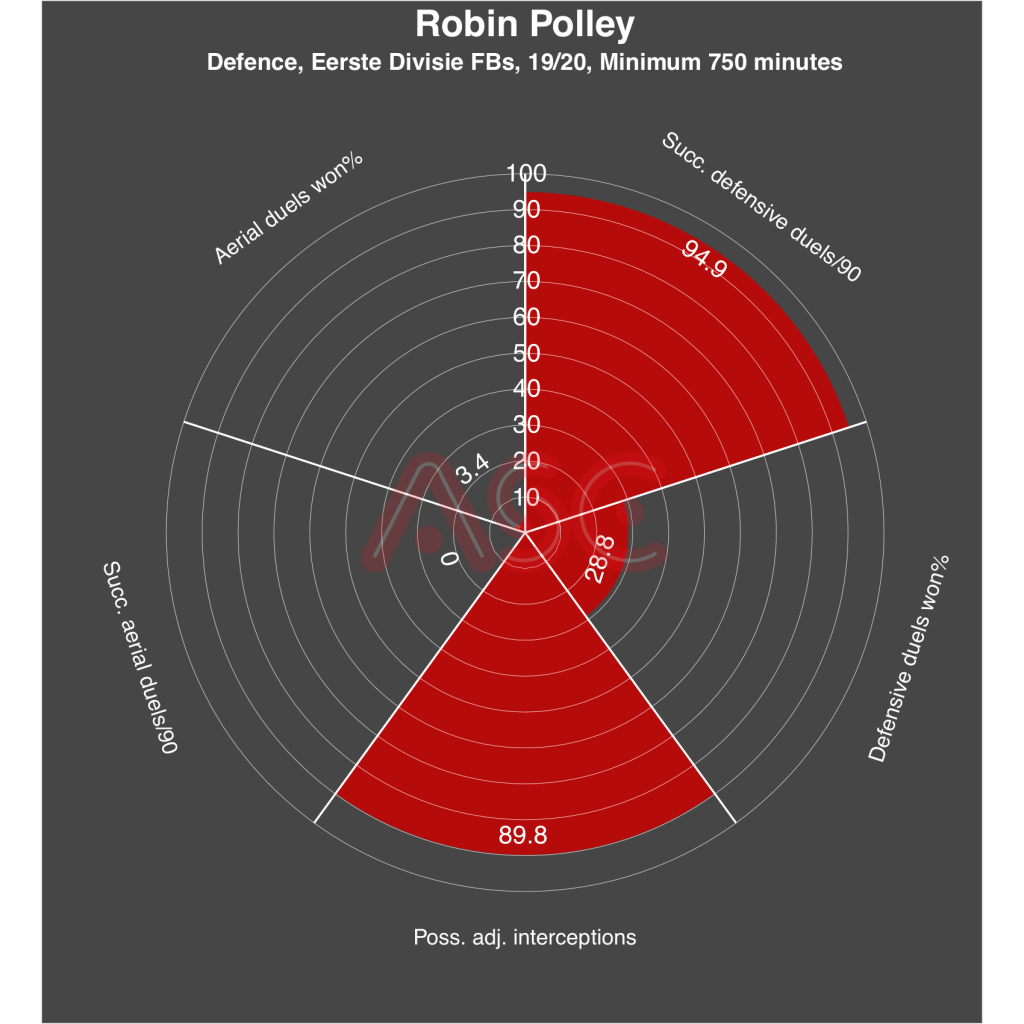
Polley understands his pace, balance and short-area quickness can be assets defensively. Athletically he was clearly superior to many of those he faced in the Eerste Divisie. Moreover, his aggressiveness complements his physical traits well, which has led to his impressive possession adjusted interception numbers relative to other Eerste Divisie full-backs. This combination of physical and mental traits has also aided Polley in achieving impressive performances in several Statsbomb statistics, including defensive pressures, pressure adjusted tackles and in the infrequency with which he is dribbled past.
However, he will need to develop further before he can be truly trusted defensively. He struggled somewhat against PSV early this season for ADO, prior to his loan at Dordrecht. Key issues were being caught square and giving the attacker a two-way go. The latter meant he was rarely in control of the attacker who could manipulate the situation as they desired. Though not a full-back, Virgil van Dijk is the world’s best at controlling and influencing attackers and could be a good study.
Another potential issue is his aggressiveness placing him at risk of being caught out of position or beaten by an attacker due to over-committing. At times, the angles he takes to the ball or the aggressiveness with which he steps up are clearly those of a player used to playing with cover behind. Playing deeper, he needs to be wary of being lured out of position and being unnecessarily aggressive in his angles to the ball and approach to winning the ball back.
Additionally, he can get fixated on the ball when it enters the final third and lose track of his threats. This also can cause him to be caught behind the rest of the defensive line. Continued emphasis on scanning and communication with his teammates can alleviate these issues.
Finally, Polley does struggle aerially, demonstrated by his low aerial duel win rate and successful aerial duels/90.
Club context
Polley’s output is particularly impressive when you consider the context of his loan club, FC Dordrecht. Dordrecht were 19th in the Eerste Divisie when it was voided and were one of the league’s worst attacking sides. They were 16th in total xG for the season, dribbles/90 and progressive passes/90 and 13th in progressive runs/90. They were 9th in crosses/90.
In light of that, Polley’s stats stand out even more. He was one of Dordrecht’s primary dribbling, progressive and creative players from the right-back position and was hugely impressive amongst all Eerste Divisie full-backs in the same categories, despite his own team’s struggles.
The following tree diagrams demonstrate Polley’s dominance statistically in his own team.
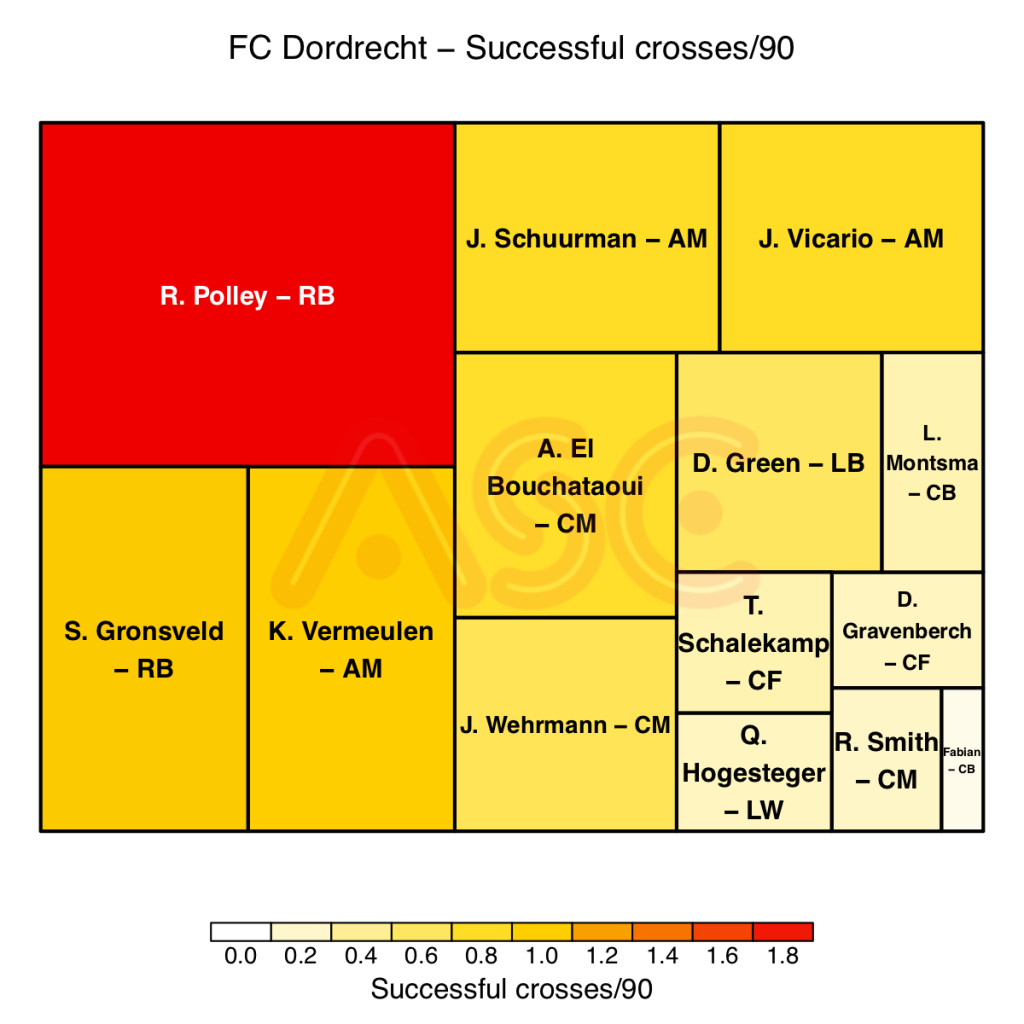
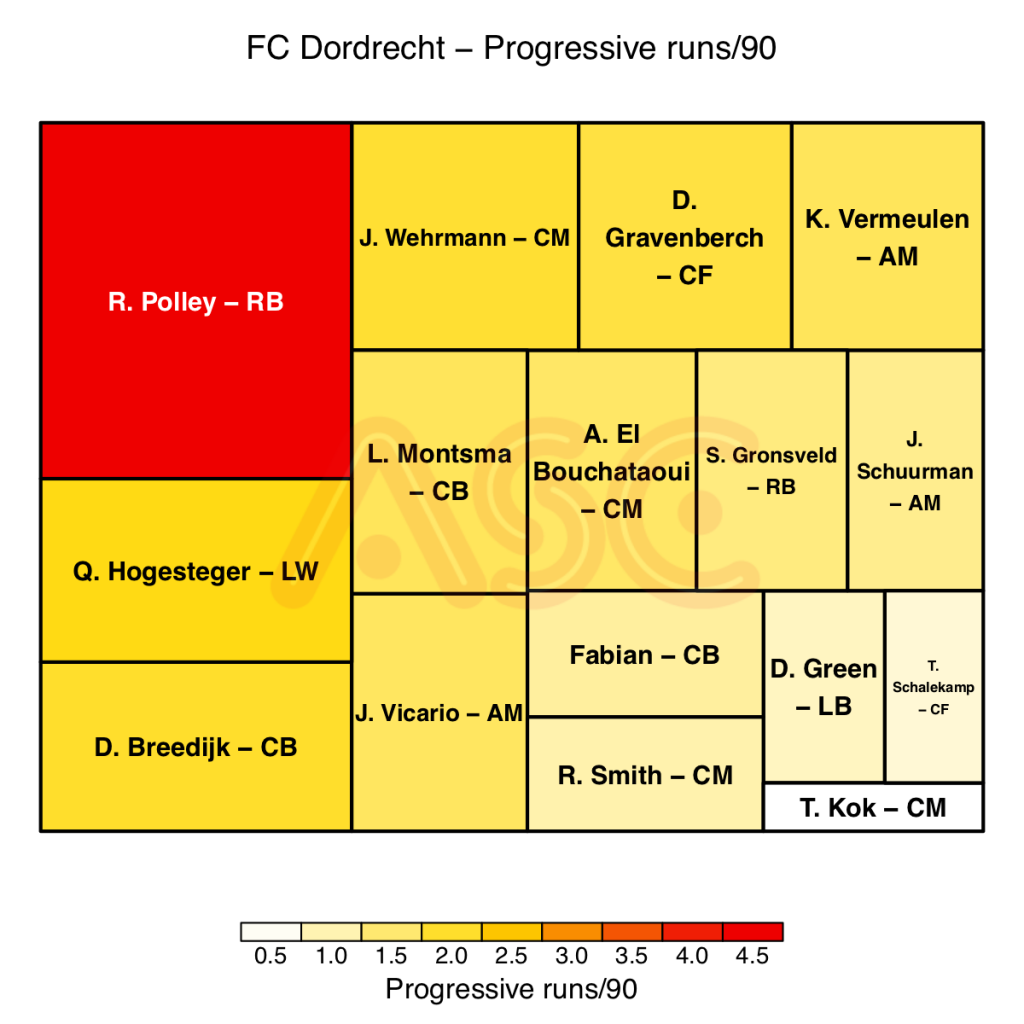
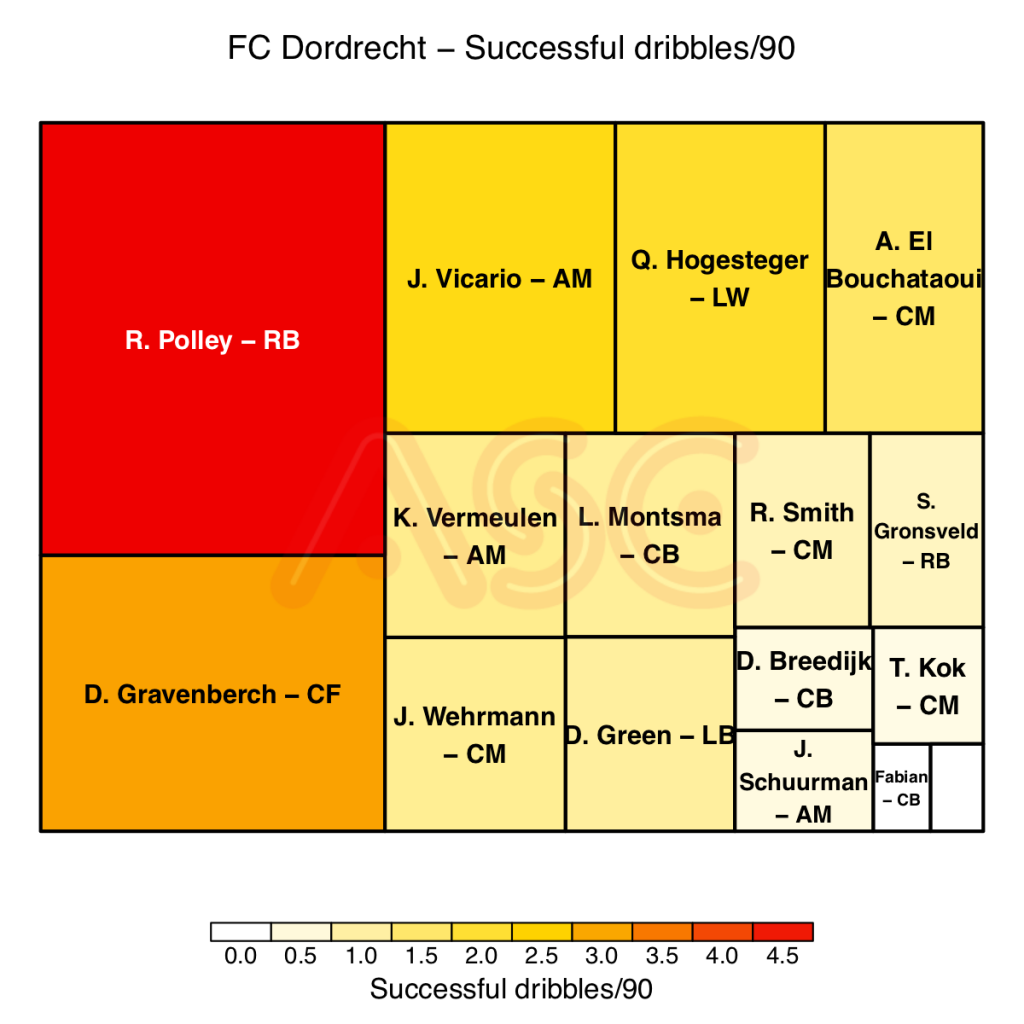
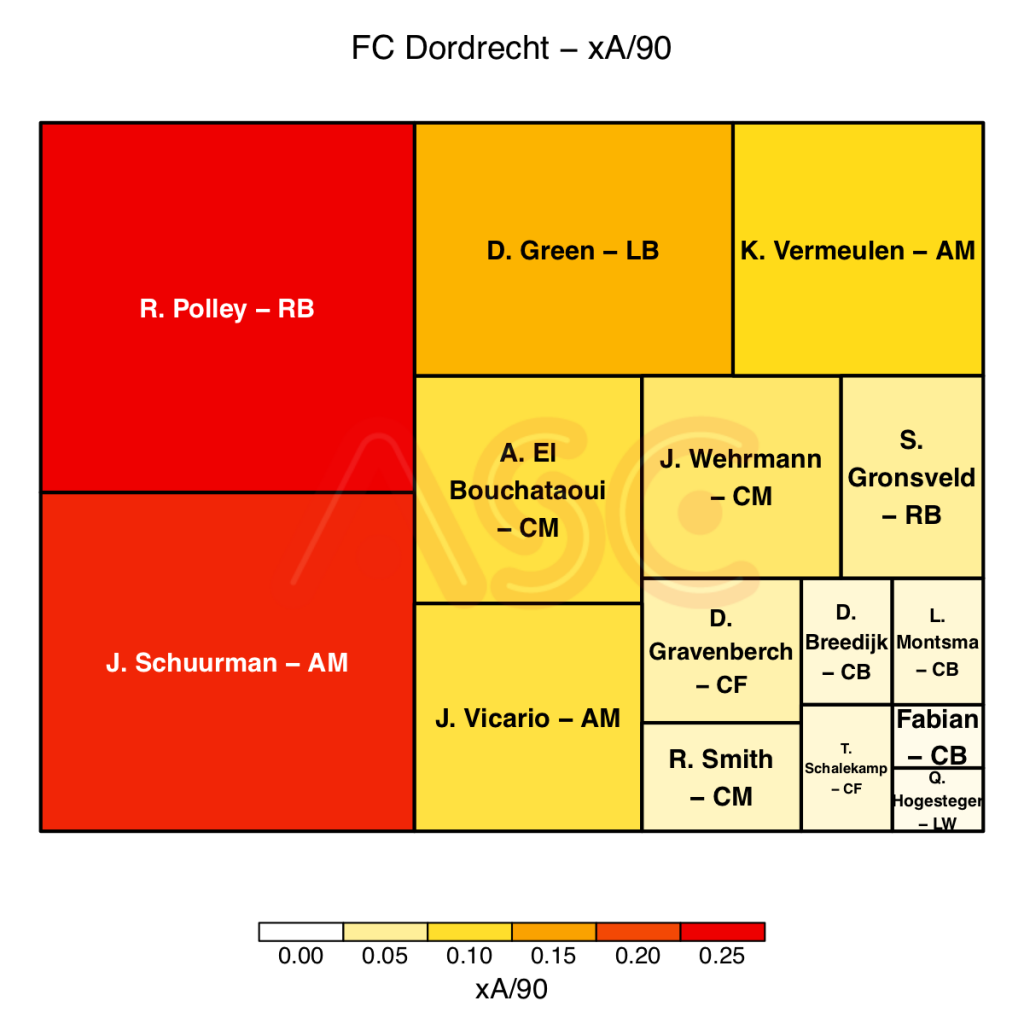
Similar players
Using a few different clustering methods, several statistically similar players to Polley have been identified. This is not necessarily to say there are qualitative similarities, but that there are statistical and, in some respects, stylistic similarities. The primary candidates are all full-backs who excel as attackers, most notably as dribblers and their attacking output. Three are represented graphically below.
Alphonso Davies, Bayern Munich
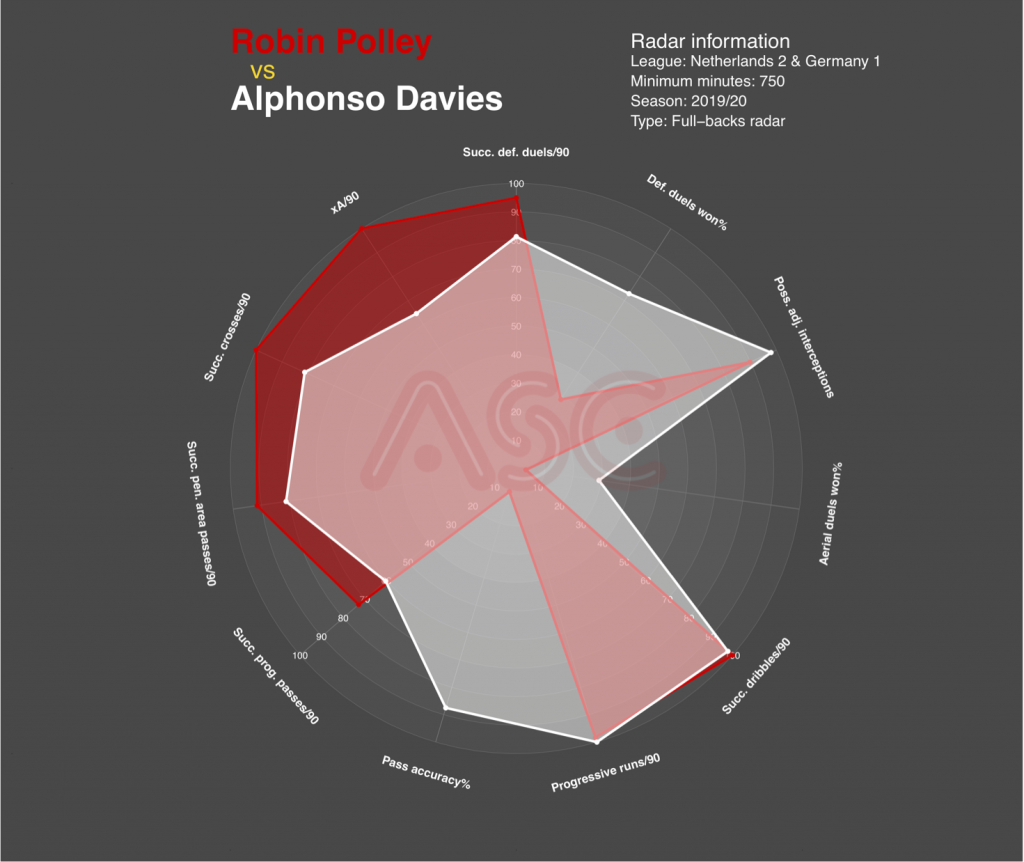
Alessio Castro-Montes, K.A.A. Gent
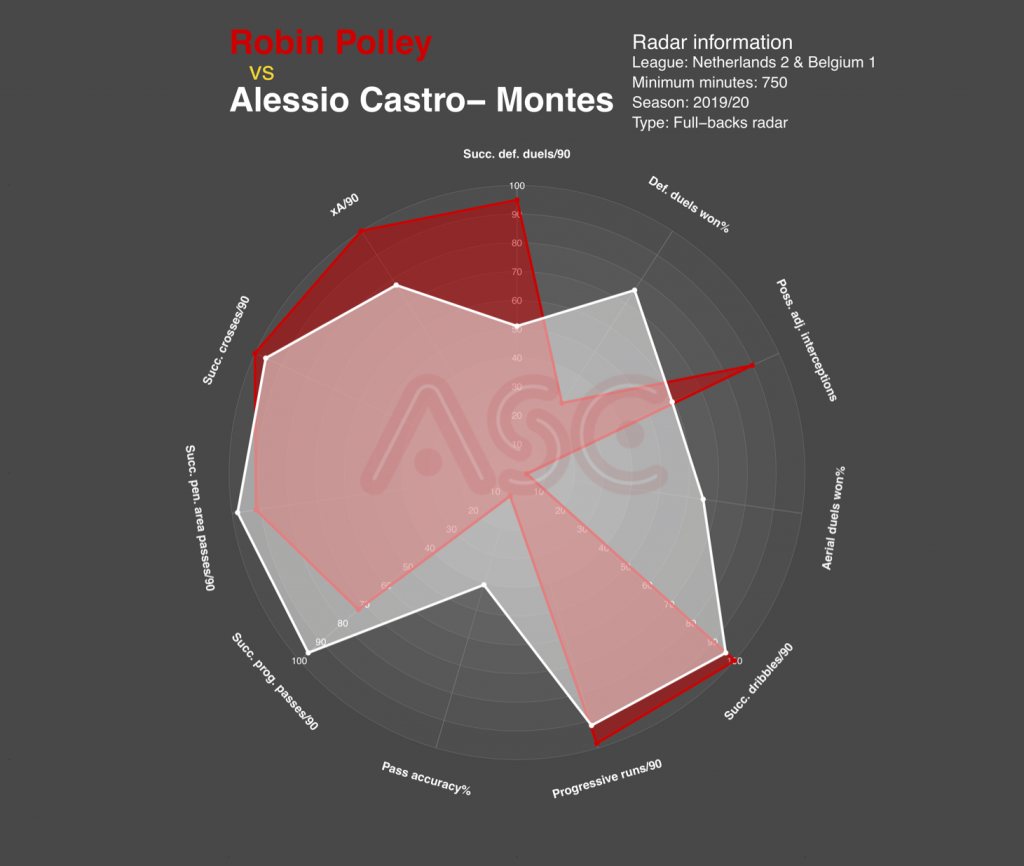
Joakim Mæhle, Genk
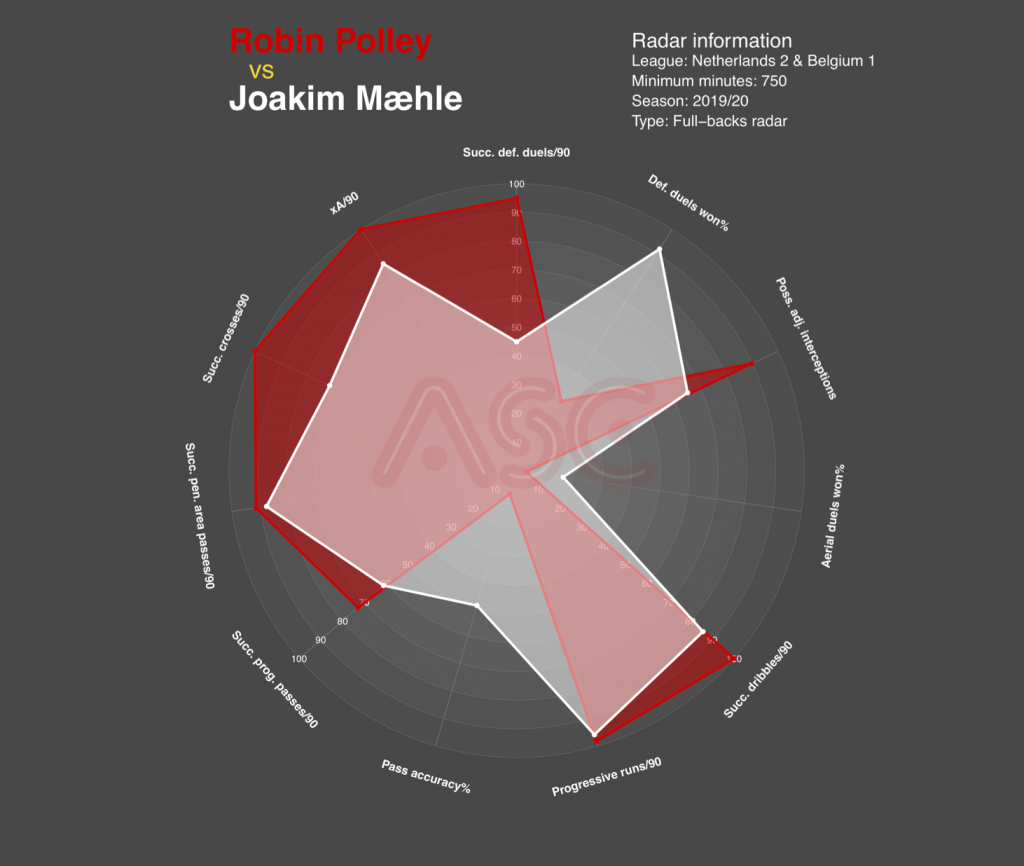
Club outlook
With ADO escaping relegation, Polley will return to a parent club in the Eredivisie. His performances in the Eerste Divisie were certainly sufficient to suggest he can perform at a higher level.
However, ADO may not be the best club for Polley’s development. A comparison to the two incumbent full-backs reveals two drastically different players. Neither Dion Malone and Aaron Meijers have anywhere near the attacking output of the young Ghanaian.
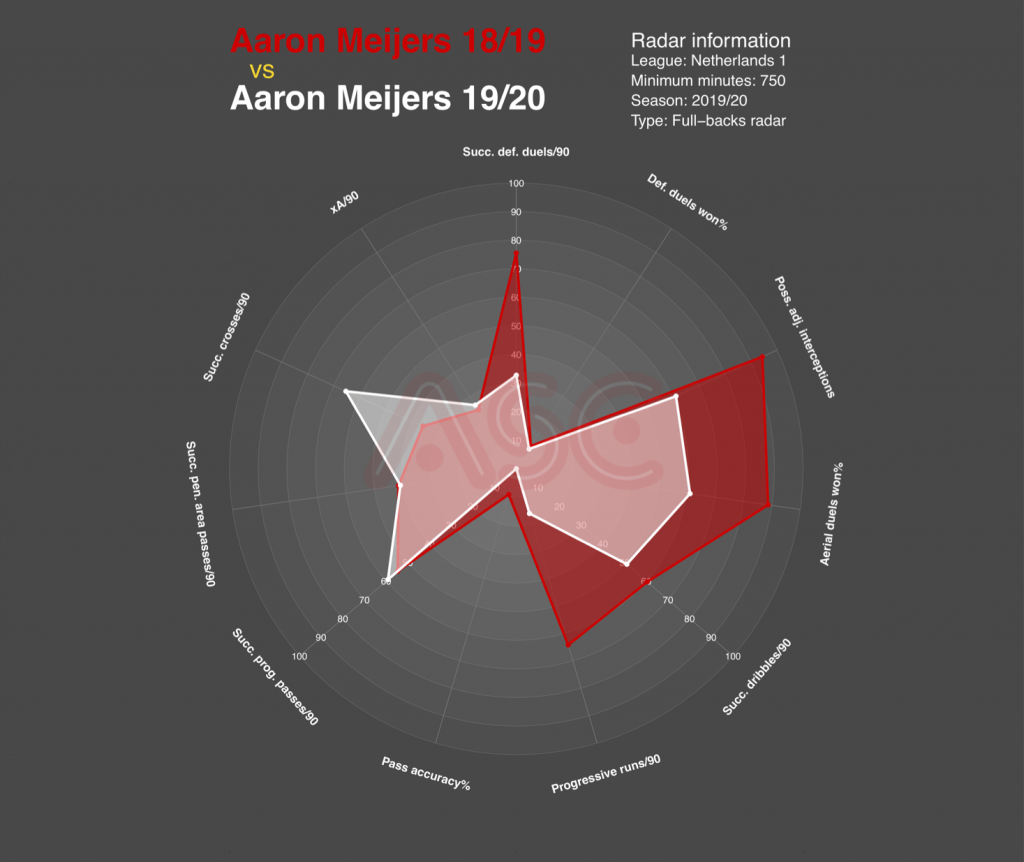
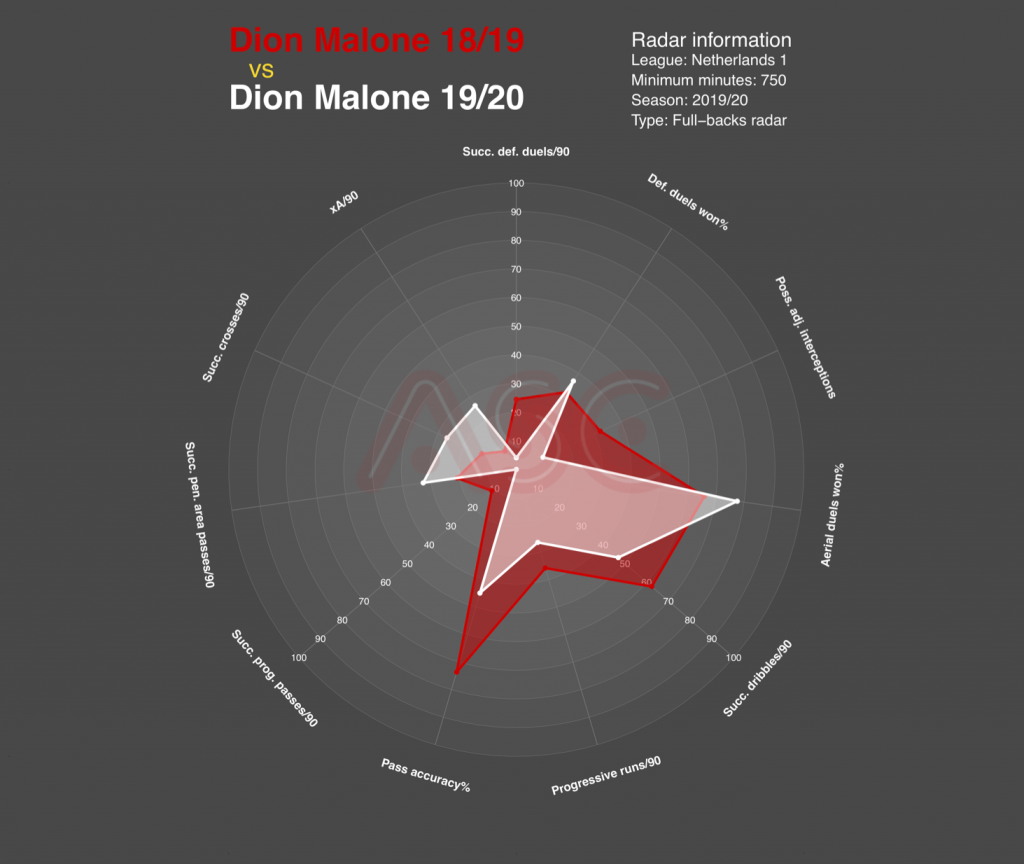
This is at least partly a product of ADO’s style, which has not been one that would appear to be well-suited to Polley’s skillset. They have gone through two different managers in the past two seasons, neither of whom played a style that required attacking full-backs. Although a new manager is yet to be installed after Alan Pardew’s departure, Polley may be poorly suited unless ADO overhauls their approach.
ADO have become increasingly direct, having the second most long passes/90 in the Eredivisie in 19/20, as well as the fewest progressive passes/90, progressive runs/90, key passes/90 and dribbles/90. Though they crossed at the fourth highest rate in the Eredivisie, they were not asking their full-backs to contribute to this significantly.
It may well be, therefore, that Polley would be well-served in moving to a club that permits him to attack with regularity, as he was at Dordrecht. He appears best-suited to a role that gives him the freedom of the right flank, allowing him to utilise his creative and dribbling abilities in the final third.
National team outlook
Ghana have used their full-backs as attacking threats on the flanks in recent seasons. Many of their most prominent wide players are best suited to coming off their flanks and playing between the lines or running in behind. Resultantly, it is a distinct possibility that new coach C.K. Akonnor will ask his full-backs to provide width to allow his wide forwards to operate inside. Such a role would suit Polley extremely well.
Furthermore, the respect Ghana’s opponents often treat them with requires a player on either flank who is capable of stretching the play, beating players and offering creativity from wide areas. In qualifying games and at the recent Africa Cup of Nations, Ghana’s opponents rarely left their defensive shape, forcing the Black Stars to try to break them down. They struggled, with a lack of quality progressive passing and penetration in the final third major contributing factors.
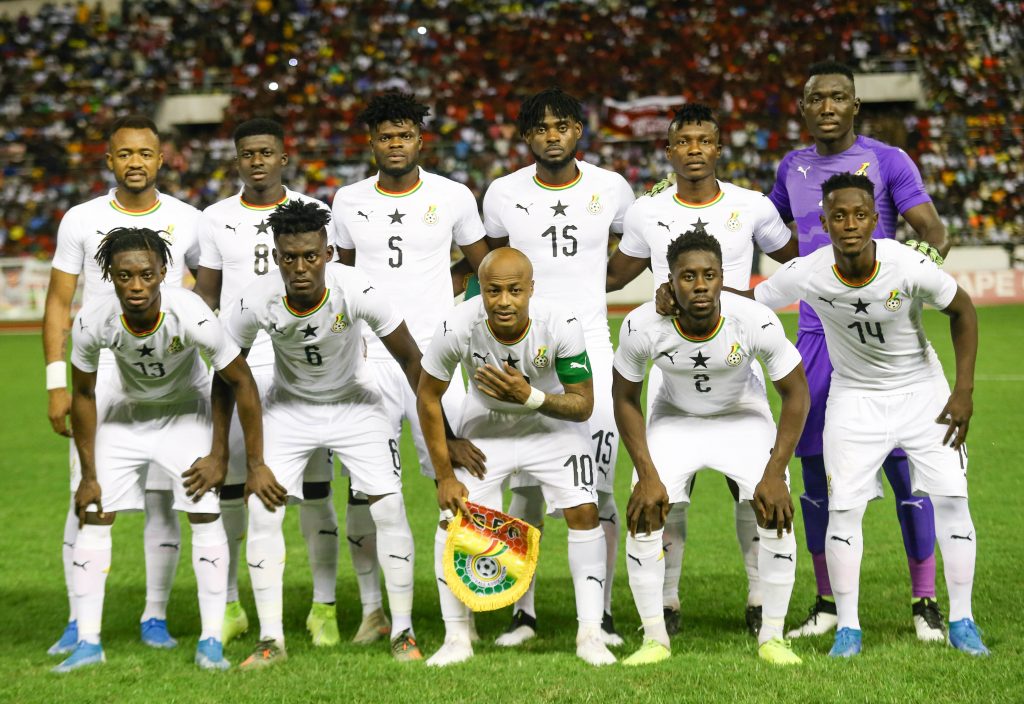
Polley has shown he has the attacking intent and technical quality to be a potential solution to those problems. He attempts penetrative offensive actions with a high frequency, progresses the ball well as a passer and runner and has the quality to beat players one vs one or one vs two. This qualitative superiority is particularly useful.
During the upcoming qualifying campaign, when football returns, the Black Stars could do worse than to give Polley the opportunity to compete at right-back with Andy Yiadom. Yiadom’s competition has been limited, with Harrison Afful turning 34 in July and Daniel Amartey’s injury problems. Adding a talented younger player like Polley to the right-back depth chart would be a positive, with the younger option bringing some genuine attacking flair and verve.
Unless otherwise stated, all data used is courtesy of Wyscout or Transfermarkt.
